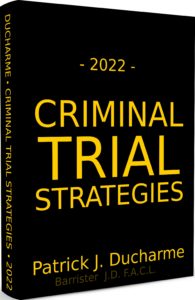The Court of Appeal for Ontario has held that trial judges have the power to manage a criminal trial.1 Two years later the Supreme Court of Canada wrote, “for our Justice system to operate, trial judges must have some ability to control the course of proceedings before them.”2 These comments may be part of an ever-increasing sense of frustration, if not despair, festering within the psyche of trial judges throughout this country.
A trial Judge has an inherent jurisdiction to control the trial process that includes a jurisdiction to manage the conduct of a trial. A trial Judge has the power, albeit a limited one, to call witnesses, to raise legal issues not advanced by the parties and to comment on evidence in a jury trial.
Many judges apparently feel that trials have become difficult, even impossible to manage in some circumstances.4 Some trial judges lack confidence in their ability to conduct a trial from start to finish without committing reversible error. Occasionally these fears prove to be well founded. Criminal trials are becoming more difficult, time consuming and complex. Additional problems may be caused by trial counsel who sometimes check their sense of civility at the courtroom door to the detriment of the trial process.
Charter issues also have had a profound effect on the length and complexity of today’s trials. One experienced trial Judge recently expressed this sentiment: “Unfortunately, no issue ever seems simple anymore, even exceeding the 80 mg percent charges”.
Charter issues have also increased the length and complexity of criminal trials. Expect our trial judges in the future to exercise more and more control over the process itself. And, new legislation aimed at streamlining mega-trials and providing more tools to move lengthy trials along has recently been passed into law. This new legislation will be discussed below.
In Pires and Lising7 Madam Justice Charron quoted with approval the following statement from Finlayson J.A. over twenty years ago in Durette wrote:
Unless we, as a court, can find some method of rescuing our criminal trial process from the almost Dickinsonian procedural morass that it is now bogged down in, the public will lose confidence with our traditional adversarial system of Justice. As Jonathan Swift might have said, we are presently sacrificing Justice on the shrine of process.
The above is the an excerpt of Patrick J Ducharme’s book, Criminal Trial Strategies, available at Amazon or in bulk through MedicaLegal Publishing.
Read or listen to the Preface and Introduction and subscribe to Patrick Ducharme’s Youtube Channel.

